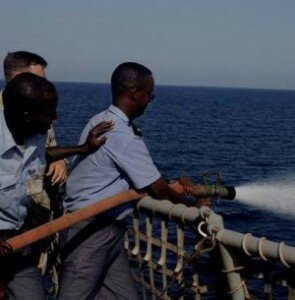 The government of Djibouti permitted the controversial private US security firm Blackwater “to operate an armed ship from the port of Djibouti” and to “use lethal force against pirates.”
The government of Djibouti permitted the controversial private US security firm Blackwater “to operate an armed ship from the port of Djibouti” and to “use lethal force against pirates.”
The permission was given in February 2009, it is revealed in a cable from the US Embassy in Djibouti, published by WikiLeaks today. Blackwater was to launch its private armed pirate hunt in March 2009, it was reported.
US Ambassador James Swan, residing in the key US allied country Djibouti since October 2008, was informed about the Blackwater-Djibouti agreement by Robert Emmett Downey, Blackwater Worldwide’s Development Manager for Africa. Mr Downey said he had received the permission to operate an armed ship by Djibouti’s head of national security and intelligence services Hassan Said Khaireh.
“This is the only such arrangement so far that Blackwater has made with a host government in the region, but Blackwater will likely engage Oman and Kenya in the future,” Ambassador Swan was told.
Blackwater, which has been involved in power abuse scandals in Iraq and Afghanistan, is the world’s largest private security company, often described as “mercenaries acting above the law” by human rights groups opposing to a privatisation of military operations.
Little has until now been known about Blackwater’s engagement in Africa in general and in the fight against Somali pirates in particular. The WikiLeaks revelation about Djibouti’s willingness to engage the company is expected to create strong reactions in East Africa.
According to the information Mr Downey gave to the US embassy in Djibouti last year, the company had received permission to operate the US-flagged 183-foot ex-research vessel ‘McArthur’, which has landing space for two helicopters. “The ship will be armed with .50-caliber machine guns, and is able to protect a 3-ship convoy,” Ambassador Swan was told. A staff of 33 US citizens would operate the vessel.
The Blackwater vessel was to participate in the international efforts to stop Somali piracy in the western Indian Ocean. These efforts have been jeopardised by limited resources and few nations being willing to send their navy vessels on longer assignments. Repeated calls for more resources have gone unanswered, leaving much space for Somali piracy operations.
In this power vacuum, Blackwater had found a “business concept,” Mr Downey explained. Blackwater’s business concept was described as “having its armed ship escort other ships requiring protection,” according to the embassy report.
“Blackwater’s counter-piracy operation does not have any clients yet, but Blackwater expects business to develop following a public launch in Djibouti in March [2009] with government of Djibouti officials,” Ambassador Swan reported.
This planned “public launch” however never materialised. According to research by the ‘New York Times’, the new Obama government reacted negatively to Blackwater’s anti-piracy plans and Secretary of State Hillary Clinton made sure the controversial company cancelled its Djibouti plans.
Washington probably reacted especially negatively to the Blackwater plans, cleared by Djibouti, as the company announced it would take no prisoners. “Blackwater has no intention of taking any pirates into custody,” Ambassador Swan reported. “While the French have previously put pirates ashore in Puntland, Downey said Blackwater had no plans to do so, either in Somalia or Kenya,” his report added.
Mr Downey had emphasised that “international maritime law allows the use of lethal force against pirates” and that this was part of Blackwater’s business plan. He also admitted that there was “no precedent for a paramilitary operation in a purely commercial environment.”
Djibouti intelligence chief Khaireh had agreed to these terms. The only demand by Mr Khaireh for Blackwater to operate its armed ship from Djibouti was the Djiboutian Navy would secure Blackwater’s weapons “while ashore in Djibouti.”
Ambassador Swan commented that Djibouti authorities probably had approved of the controversial deal mainly due to commercial reasons. “Blackwater’s presence in Djibouti would make it one of the largest US businesses operating in the country,” Mr Swan commented.
But the Ambassador also made it clear he was sceptical about the Blackwater announcement, saying he would “appreciate [the State] Department’s guidance on the appropriate level of engagement with Blackwater.” Ms Clinton reportedly advised against the embassy’s engagement.
=========================
Source:-Afrol.




Always had respect for Mr Gelle and his human ways for that tiny country.If this is correct I might only say that ,the poor man has been forced to do that,as I am aware of such a corporations and its power. Dont sell yourslv out to this thugs.They are far worse than somali pirates,and as I se this can be the last effort to get rid of this poor pirates.
Pirates has become a bloody hot policy cards all around the world.
These thusgs and the like has destroyed all so called somali nation and its people the remaining piece of land for us is Djbuuti and now there it goes to the wolves.
Abdullahi,